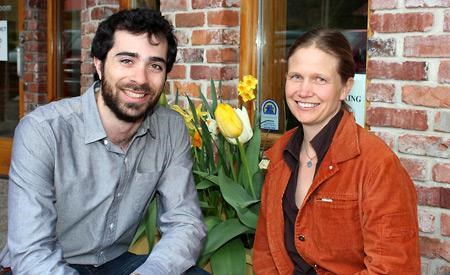A research report by a University of BC student documents best practices in organic waste collection in Powell River.
Coco Hess, part of the Let’s Talk Trash team, worked with Noah Rosen as part of his course work for an environmental geography course. He prepared a report about best practices for curbside organic waste collection in Powell River.
Hess and Rosen made presentations about his report at both the City of Powell River’s and Powell River Regional District’s committee-of-the-whole meetings on Thursday, April 18.
To prepare his report, Rosen completed a literature and case study review, met with city and regional district staff and conducted a survey.
After the case study review, Rosen concluded that mandatory programs were more successful in terms of diversion rates than voluntary programs, sometimes 50 to 60 per cent more so. Other drivers of participation include the provision of curbside and kitchen collection bins, reduced organic waste disposal rate and high frequency of collection.
“It is a dynamic process,” Rosen said. “Curbside organic waste collection, in its planning, implementation and operation, needs to be monitored and adapted and the public needs to be educated as the whole process moves along to be successful.”
As well, success comes through cooperation, Rosen said. “I found that in every successful case study that I looked at, there was cooperation and communication between the levels of government involved.”
After meeting with city and regional district staff, it became clear that one of the issues is where the money is going to come from for the program, Rosen said. “But more unique to the curbside organic waste collection was the uneven service provision,” he said. “The density in the city justifies curbside collection, which is not the case in the electoral areas. The fact that some residents get the service while others don’t can lead to conflict.”
While the survey was completed by only 55 residents, 75 per cent of them reported they already compost in their backyard, which Rosen said is significant.
Rosen’s best practice recommendations are: good communication between the city and regional district; universal service provision; and a high diversion rate.
“If Powell River wants to have a centralized composting facility, there’s a minimum level of compost that needs to be going into that for it to be economically viable,” Rosen said. “That’s only going to happen if people are participating, which the literature shows happens most when it’s mandatory.”
Hess explained that at this point, Rosen’s report was being presented for information and to “keep the conversation going.”
That conversation is taking place between city and regional district staff.
In September 2012, the regional district board adopted a seven-step action plan recommended by the composting advisory committee, a group established in the fall of 2011 to evaluate the feasibility of a centralized composting facility for the region.
The regional district contracted with a consultant, Net Zero Waste, to analyze the issue and work with the committee. The committee’s recommendation was based on the consultant’s final report. It stated the first step in the process is determining if enough organic material can be collected in the region to make a composting facility viable. Since the majority of the population lives within city boundaries, the consultant advised that the city should incorporate the collection of organic material in its curbside collection program.



